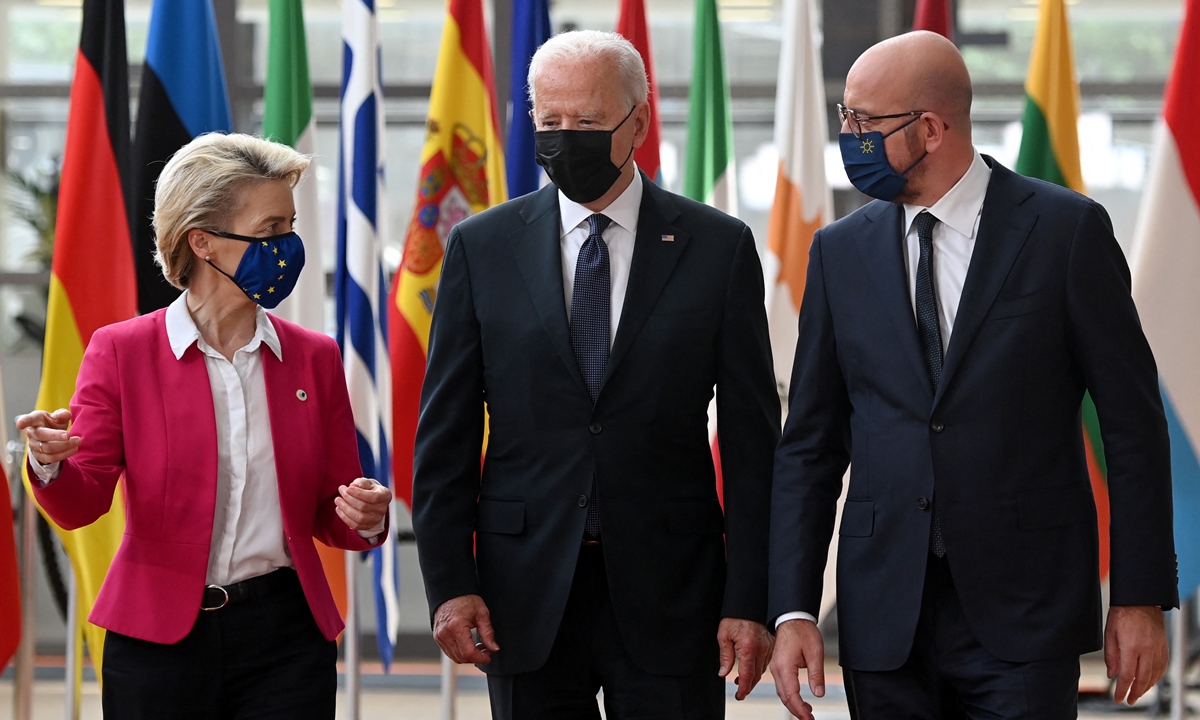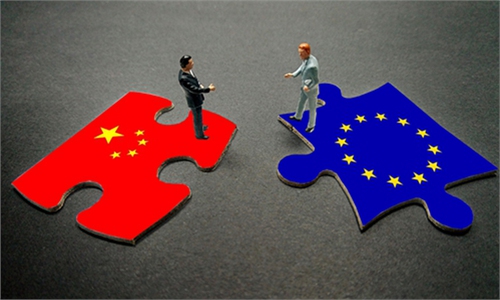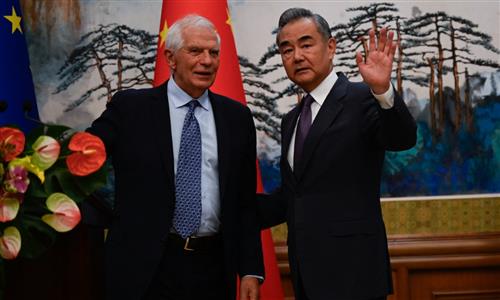US-EU summit 'hard to ink substantial deal'; Divergences 'profound within allies' on China-related affairs

(From left) President of the EU Commission Ursula von der Leyen, US President Joe Biden and European Council President Charles Michel. Photo: AFP
The US-EU summit, featuring US President Joe Biden, European Commission President Ursula von der Leyen and European Council President Charles Michel, is scheduled for Friday at the White House.
Analysts said the summit is an important event where the US and Europe are trying to actively coordinate strategically. However, given the differences in their respective policies toward China, as well as the different voices within Europe regarding its relationship with China, it will be difficult for the US and Europe to reach a consensus on China at this summit, and US-EU joint statement expected to be issued during the summit could be no more than political cliché.
According to South China Morning Post, the transatlantic allies on Wednesday were frantically negotiating a statement to crown Biden's meeting with EU leaders, but arguments over China-related issues have pushed preparatory talks into overdrive.
A Washington-based public policy institution Center for European Policy Analysis (CEPA) published an article on Wednesday titling "'Steely Stuff' Dominates Upcoming EU-US Summit," which predicted that "A transatlantic trade truce on steel and aluminum could represent a major advance in combating climate change and China. Or it could underline transatlantic differences. The jury remains out."
Media reported that on trade, an expected deal on steel and aluminum is beginning to look doubtful. The US wants the EU to probe overcapacity in the global industries of the two metals, with a view to slapping tariffs of 25 percent on steel products and 10 percent on aluminum from China, by far the world's biggest exporter of both product groups.
In return, the EU wants the permanent and full revocation of all Trump-era tariffs on its products, a deal it was hopeful of securing as recently as last week, SCMP reported.
Lü Xiang, a research fellow at the Chinese Academy of Social Sciences, told the Global Times on Thursday that the US is attempting to maintain its hegemony by demanding Europe to sacrifice its own interests in the entire trade and technology field. Especially when it comes to trade and technology exports, the US will require Europe to fully comply with American standards.
"However, if the European countries eventually realize that being allies of the US comes at the cost of sacrificing their own interests rather than gaining anything, this relationship will ultimately be unsustainable," Lü said.
The fundamental reason for their divergences is that the US wants to strategically utilize the EU and force the latter to strictly follow its policies, while the EU seeks to demonstrate autonomy in both strategic and economic aspects, Li Haidong, a professor at the China Foreign Affairs University, told the Global Times on Thursday.
"Although the US' efforts to influence Europe strategically will not cease, Europe's efforts to maintain its own interests and dignity and achieve autonomy will also not stop. Therefore, we cannot ignore the differences between the two sides, which are always present and quite profound," Li noted.
Considering their different interests over the China-related issues, the US and EU are very hard to reach a substantial deal targeting China, according to the analysts.
Although Europe is under immense pressure from the US, they also see that the election situation is very uncertain as the US has stepped into its election year, Lü said.
"Even if they sign something with Biden now, it is unclear whether it will be effective in the future, so I tend to believe that European leaders will choose to observe further," the analyst said.
As the EU places great importance on its trade and economic relationship with China, it is difficult for it to completely follow the US which intends to use trade issues as a geopolitical tool, Li said.
While there may be some coordination on China-related trade issues at this summit, it will be challenging to reach a consensus or even bind together for geopolitical competition with China using trade as a tool, Li predicted. "Even the US itself is not willing to completely decouple [from China]. Europe is even less likely to do so."
"Europe will naturally have reservations when the US wants to unite it against China, especially when there is no constructive outcomes on the Ukraine crisis and the escalating Middle East issues" Li said.


